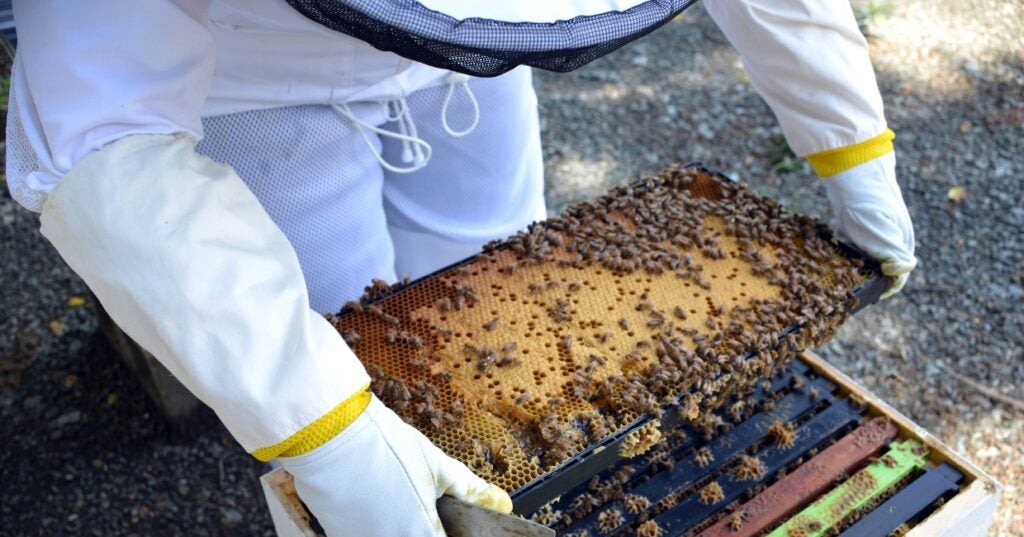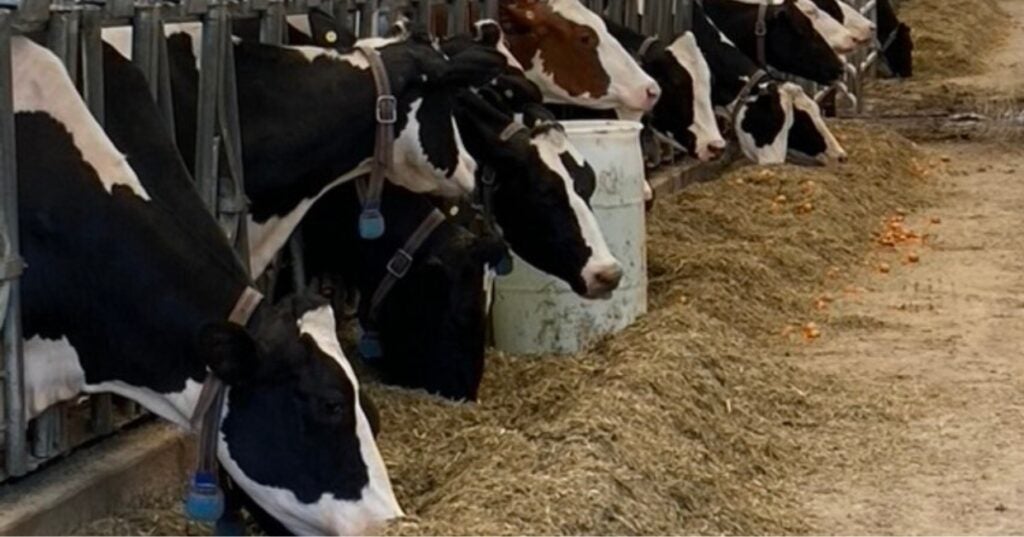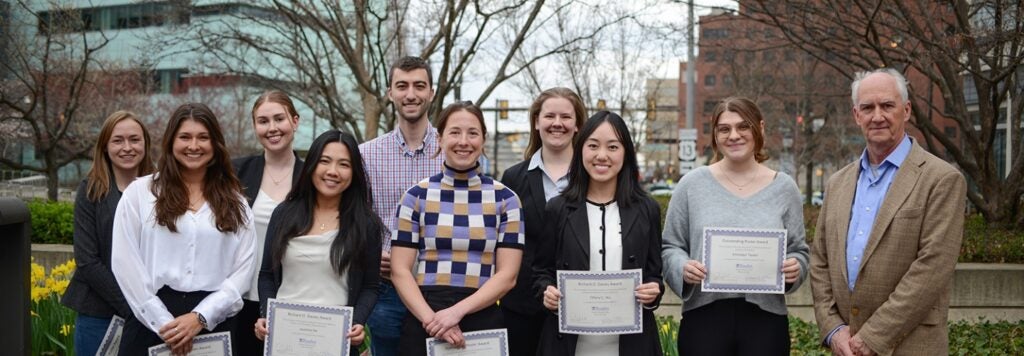Creating ‘Farms of the Future’: New Penn-led webinar series to host grassroots discussions about sustainable, regenerative agriculture
A new virtual symposium series presented by the University of Pennsylvania’s School of Veterinary Medicine (Penn Vet), in collaboration with PennPraxis, the community engagement arm at the University of Pennsylvania Stuart Weitzman School of Design, will explore the advantages, challenges, and opportunities surrounding animal agriculture and food production systems within Pennsylvania, the surrounding region, and across the United States.
Comprised of seven individual virtual sessions, the Farm of the Future Symposium series is set to deliver practical, applicable insights from a cross-section of experts and thought leaders, including agriculture industry innovators, farmers and other agricultural producers, ecologists, landscape architects, as well as industry advocates and policymakers.
The series’ speakers will be structured to stimulate conversations on a broad range of topics pertinent to farming practices such as agribusiness economics and profitability; food security and urban wellness; water and natural resource management; on-farm biodiversity; pasture and nutrient management; rotational grazing; and beyond.
“Our primary goal for this immersive series is to cultivate an authentic and pragmatic discussion about agriculture and how our food is – or could be – produced,” said Gary Althouse, DVM, PhD, Associate Dean of Sustainable Agriculture and Veterinary Practices at Penn Vet.
“While offering a platform to raise awareness of the many critical challenges facing agriculture today, the Farm of the Future Symposium series is also a token opportunity to hear directly from producers and other members of the industry about their own needs and desires for tangible livestock farming systems,” Althouse added.
Ultimately, the symposium’s grassroots conversations will serve as the bedrock for designing an interdisciplinary, living “farm of the future” model to be built on Penn Vet New Bolton Center’s nearly 700-acre campus in Chester County, Pennsylvania. Once established, the model operation will be a critical tool in advancing environmentally, and economically, sustainable farming practices while simultaneously serving as a regional resource for producers to gather more on-farm information to aid in their decision to incorporate these practices into their own agribusiness operations.
“As a veterinary school, our role does not simply begin and end with animal health,” added Althouse. “On one hand, we can intimately understand and appreciate the specific challenges that agricultural producers face. On the other, we have direct access to a robust, multi-disciplinary expertise network – both within Penn Vet and across Penn’s tapestry of schools and centers – to collectively offer inventive solutions to unmet regional and societal needs under the One Health umbrella,” he said.
“Together, we hope to forge a viable, progressive animal production-based farming model that will ultimately bolster the resiliency of Pennsylvania’s leading industry: agriculture,” Althouse added.
The series, which is scheduled to begin on September 30, 2020, will be held every Wednesday afternoon from 2pm-4pm through November 18, 2020.
After kicking off with a live introductory event, each session will include distilled presentations, followed by a 45-minute live discussion with the featured speakers. Participants will have the option of reviewing material in advance of the live discussion at a time that best fits their schedule.
The Farm of the Future Symposium series is free to attend and open to the public.
About Penn Praxis:
Founded in 2001, PennPraxis serves as center for applied research, practice and engagement at the University of Pennsylvania Stuart Weitzman School of Design. PennPraxis does projects that demonstrate the power of interdisciplinary design, art, planning, and heritage preservation to respond to the major challenges of the built and natural environments, and the communities that inhabit them. PennPraxis projects strengthen Weitzman as a school focused on high social impact design. We create opportunities “beyond the market” to help our students develop agency in the world, and we cultivate diversity among the next generation of leaders.
About the Weitzman School of Design at Penn:
The University of Pennsylvania Stuart Weitzman School of Design prepares students to address complex sociocultural and environmental issues through thoughtful inquiry, creative expression, and innovation. As a diverse community of scholars and practitioners, the School is committed to advancing the public good–both locally and globally–through art, design, planning, and preservation.
Related News

A New Penn Vet Study Aims to Shed Light on Honeybees’ Foraging Habits, with an Eye Toward Aiding their Survival
A new study recently underway at the University of Pennsylvania School of Veterinary Medicine’s (Penn Vet) New Bolton Center, led by Associate Professor of Epidemiology Laurel Redding, aims to shed…

Food waste: Recycling, not discarding, offers huge environmental benefits (link is external)
Researchers at Penn Vet examine how common food waste recycling methods, including composting, could have a big impact on greenhouse gas emissions and the use of natural resources.

Students and Faculty Mentors Recognized at Penn Vet’s 2025 Student Research Day
On March 28, 2025, students and faculty mentors were highlighted at the University of Pennsylvania School of Veterinary Medicine’s (Penn Vet) 2025 Student Research Day, an annual symposium at Penn…
About Penn Vet
Ranked among the top ten veterinary schools worldwide, the University of Pennsylvania School of Veterinary Medicine (Penn Vet) is a global leader in veterinary education, research, and clinical care. Founded in 1884, Penn Vet is the first veterinary school developed in association with a medical school. The school is a proud member of the One Health initiative, linking human, animal, and environmental health.
Penn Vet serves a diverse population of animals at its two campuses, which include extensive diagnostic and research laboratories. Ryan Hospital in Philadelphia provides care for dogs, cats, and other domestic/companion animals, handling more than 34,600 patient visits a year. New Bolton Center, Penn Vet’s large-animal hospital on nearly 700 acres in rural Kennett Square, PA, cares for horses and livestock/farm animals. The hospital handles more than 6,200 patient visits a year, while our Field Services have gone out on more than 5,500 farm service calls, treating some 18,700 patients at local farms. In addition, New Bolton Center’s campus includes a swine center, working dairy, and poultry unit that provide valuable research for the agriculture industry.

